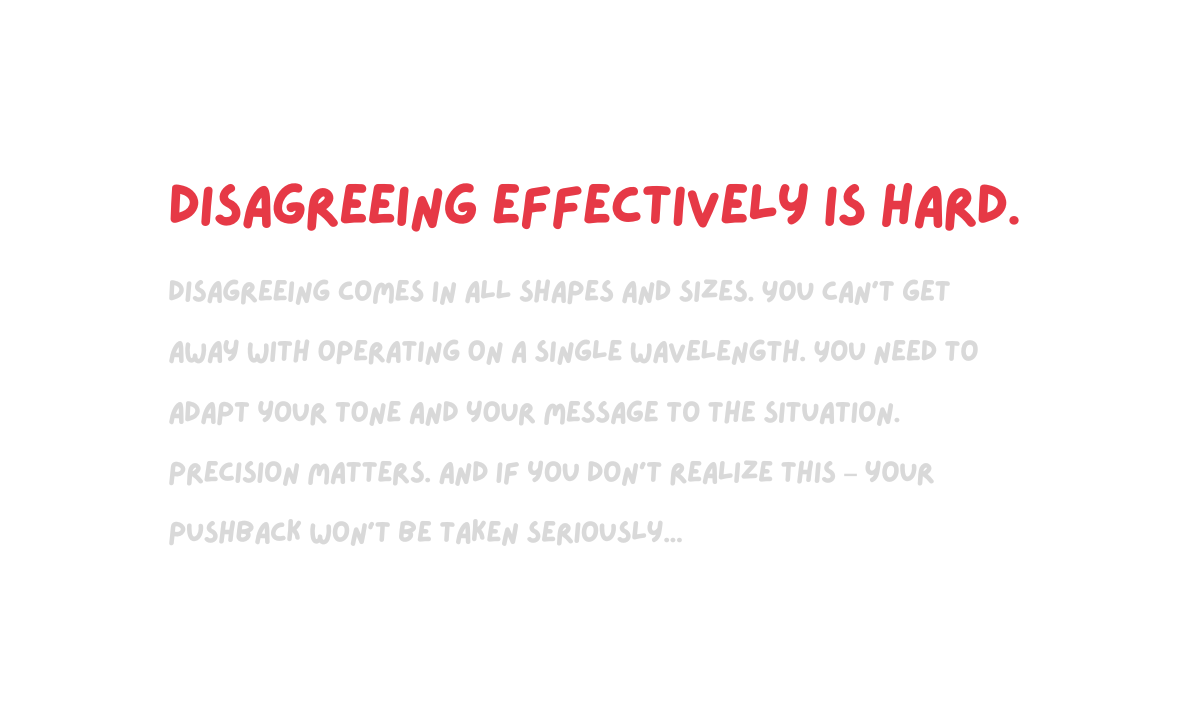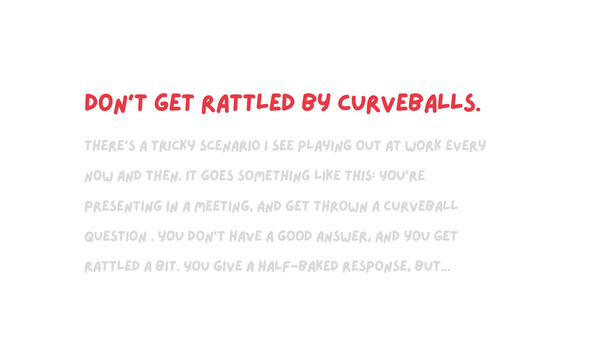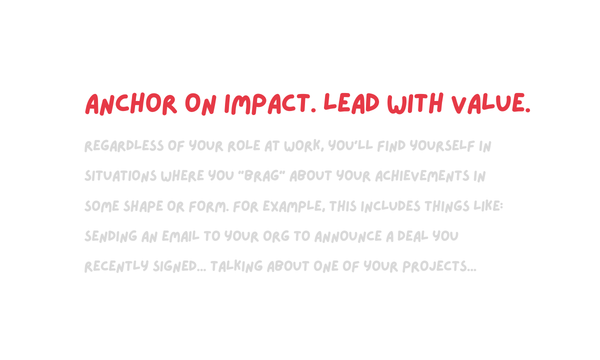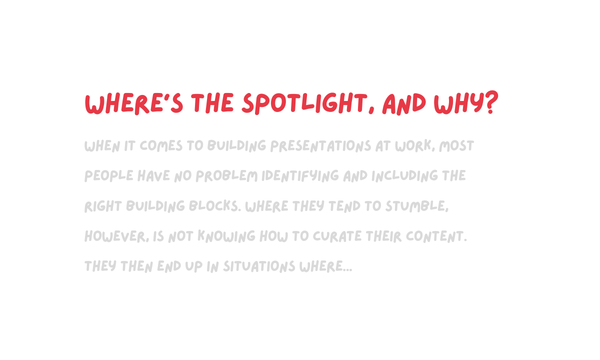How to disagree (without being annoying)

I heard a complaint from a friend recently about a disagreement that happened at work.
So I suggested that my friend rectify the situation by giving feedback to the other party, to which they said:
"No, it won't work. They hate it when people disagree with them."
I didn't say much in the moment. After all, I respected my friend's read of the situation. But I left the conversation with an unscratched itch.
Because I suspected that there was something more subtle at play.
"Why aren't they listening?"
Disagreeing is hard. Disagreeing tactfully and effectively is even harder.
And one thing that tends to get overlooked?
It's the fact that disagreeing comes in all shapes and sizes. Different situations call for different approaches. Finesse matters.
And if you don't realize this – your pushback won't be taken seriously. Your feedback might end up being discounted or dismissed entirely.
(And sure, my friend in the story may have had tough stakeholders. But I suspect this was also the issue.)
So in today's newsletter: we'll talk about the mistakes to watch out for when you're disagreeing in different situations – and practical tips to apply instead.
👋 Join 5000+ readers and subscribe to Herng's Newsletter for free:
#1 When you feel very, very strongly
Let's get the seemingly obvious one out of the way.
If you find yourself in a situation where you completely disagree with an opposing viewpoint? Great. Good on you for taking a stand.
But here's a common mistake people make: letting passion and conviction come at the expense of constructiveness.
Just because you're willing to die on a particular hill does not give you the license to voice your pushback in a lazy manner. You still have to be constructive.
But what exactly does it mean to be "constructive" in these situations? Let's be specific.
You should ask yourself 3 key questions:
- Can I articulate the principles behind my objection?
- Can I pinpoint the specific part(s) I'm opposed to?
- Can I suggest a better alternative (and justify it)?
For example, here's a poor way of disagreeing:
- ❌ "This new budget approval process doesn't make any sense: we never had to submit these details in the past, and it's going to make our lives very difficult. I talked to lots of folks as well, and they all say the same thing."
Notice how there's no anchoring on actual principles. It also fails to offer any meaningful solutions.
Instead, it relies on "things were fine in the past" and "a lot of people agree with me" as its core arguments.
By contrast, here's a much better way of disagreeing:
- ✅ "I'm concerned with this new budget approval process. The process is redundant for 80% of cases, and the manhours required seem extremely high. Could we consider only applying this new process to first-of-kind or high-spend cases? Or conduct a 3-month pilot for select teams first to gain learnings?"
Again, you have every right to disagree vehemently. But you only earn the right to do so if you can:
- ...articulate the right principles (e.g. "wasted manhours is a concern")
- ...pinpoint the specific issues (e.g. "the process is redundant for 80% of cases")
- ...offer better alternatives (e.g. "let's set a threshold, or do a pilot first")
#2 When you feel somewhat strongly
Fortunately, most people don't find themselves in situations everyday where they have to violently disagree.
Instead, we tend to find ourselves in situations where we do have a strong point of view... yet still want to keep the door open.
You know, just in case we don't have the full picture. Just in case we're wrong.
But this is hard. And most people end up not finding the right balance. So they...
- ...either come off as overly confident or stubborn (in order to defend their point of view)
- ...or overcompensate by caveating excessively, thereby weakening their own message
For instance, imagine again that a new budget approval process is being rolled out, and we disagree rather strongly with it.
A common mistake? Not knowing how to find the right balance between assertiveness and empathy. Not knowing how to push back strongly without coming off as dogmatic.
That mistake can then manifest itself in one of the following ways:
- ❌ Overly confident: "There's no way this process will actually work – it will just end up creating a lot of operational tax. It doesn't make sense for most of the cases we deal with either."
- ❌ Overly deferential: "This process might end up wasting a lot of time – but maybe I'm missing some context. Accountability is important after all. If this has been thought through deeply already, I'm sure there's a good reason."
- ❌ Confusing: "I like that this process intends to help with accountability. I'm just not sure the wasted manhours are worth it – but maybe we've thought through the trade-off's and think it's worth pursuing. Then again, I do wonder if a blanket criteria is the best option: but no harm in trying first I suppose."
Consider, however, if we had the finesse to respond in the following ways instead:
- ✅ Straightforward, yet objective: "I'm uncomfortable with the new process, and I'd like to share why. I'm all for accountability, but the manhours required seem disproportionate. I'd like to suggest a couple better alternatives, and would love to get this group's feedback."
- ✅ Empathetic, yet firm: "I'm supportive of more governance, but I worry that this process creates too much operational tax. I'm sure that was never the intention, but I'd like to share a couple recent examples to illustrate the potential downside. I'd also like to suggest an alternative solution."
- ✅ Leading with curiosity, yet focused: "I'm curious: have we estimated how many manhours are required to make this process work, and are we comfortable with that trade-off? I like the spirit of the new process, but I worry about the implied cost. What if we apply this process to only the critical cases?"
There's no one single right answer, of course: it all comes down to the specific stakeholder and situation at hand.
But the point is this: even when you have a strong point of view – you do not have to deliver your pushback in a uniform way.
Because you have many shades of grey to play with – and you should. Don't end up at the extreme ends of the spectrum due to lack of finesse.
👋 Subscribe for free to get Herng's newsletter directly in your inbox.
#3 When you kind of care (but not enough)
The last situation we'll cover is this: when you do care – but maybe just not enough.
When does this happen? Here are some examples:
- You disagree with something – but practical constraints (e.g. lack of time) render it impractical to do things differently.
- You disagree with something – but it's not a hill you're willing to die on. If push comes to shove, you're OK to concede. You have bigger battles to fight.
- You disagree with something – but the stakes are much higher for the other person. You don't have as much skin in the game.
A common mistake in these situations?
It's to voice your disagreement (either out of principle or reflex) – yet underplay it and undermine your credibility.
Because while you do care – you just don't care enough. And that's a dangerous combination.
How does this manifest itself in reality? Here are some examples:
- ❌ "I'm not sure these are the right assumptions to use for the analysis, but I think it's fine at this point since you're presenting it in two days." (OK, so is it a big deal or not? Are you saying my work is completely wrong?)
- ❌ "I'm really not a fan of this new process, but if most of the group is OK with it, I'll figure out a way to follow it, no worries." (OK, so do you actually care? If not, why'd you bring it up?)
- ❌ "Out of principle, I just want to say I still don't think XYZ is the right option... but I understand your rationale, and I won't be a blocker for execution." (OK, but what value are you actually adding then?)
The common theme here? It's that you might unintentionally come off as passive-aggressive.
Because while you may think you're doing the other person a favor by "going out of your way" and offering counsel?
You actually come off as wanting to steer without actually taking any ownership.
You come off as wanting to claim credit (if a "I told you so" situation arises), without taking on any of the accountability from picking a side. You're hedging.
It's well-intentioned. But it can backfire and frustrate others instead.
So the next time you find yourself in these situations? Consider applying the following principles:
✅ Acknowledge any constraints explicitly: Be empathetic. Make clear that you're trying to be helpful, instead of trying to create more stress. Example:
"I know that it's probably hard at this point to make any changes, so I'm definitely not trying to make things more complicated – but I did notice one critical issue that I'd like to flag to you..."
✅ Establish the value of your message. Even if you don't feel the need to fight this battle, explain why your message has value. If someone can't figure out what to do with your feedback, it is more irritating than helpful. Example:
"To be clear – I don't think we need to redo the process this time – but the next time we do this, you could potentially save a lot of time by consulting this other team first and lifting their materials directly."
✅ Respect their steer – or jump on the same boat. No one likes an armchair quarterback. So make clear that you're not trying to dictate from afar. Or, if possible – offer to actually help! Example:
"I understand it is hard to action on every piece of feedback, so please only prioritize the ones that makes sense to you at this stage. Here are 3 issues I've noticed with this analysis..."
An alternative example:
"I'm concerned that this framework doesn't factor in competition, which could directly affect your conclusion. I happen to have some experience in this area – would it be helpful if I took a stab at building an alternative framework for you to consider?"
Of course, you have to pick your battles. You won't be able to jump in and offer your help on everything (nor should you). You're also allowed to commentate without being forced to roll your sleeves up.
Whatever you do – just make sure you're intentional about finding the right balance.
👋 Join 5000+ readers and subscribe to Herng's Newsletter for free:
Quick recap
To summarize, here's what we covered today:
- You need finesse when it comes to voicing your disagreement. You can't operate on a single wavelength. Nuance matters. Precision matters.
- When you disagree very strongly: Don't forget to be constructive. This means that you are precise about what you disagree with, that you anchor on actual principles, and that you offer meaningful solutions.
- When you disagree somewhat strongly: Remember not to sabotage yourself as you try to balance confidence with empathy. Find ways to be straightforward yet objective, and empathetic yet firm.
- When you disagree (but don't care that much): Remind yourself not to become an armchair quarterback. You're allow to offer advice without extending help, of course. But do it in an empathetic way – and ensure that you're actually adding value.


